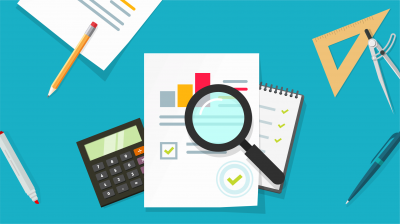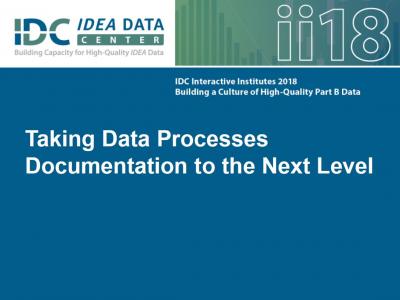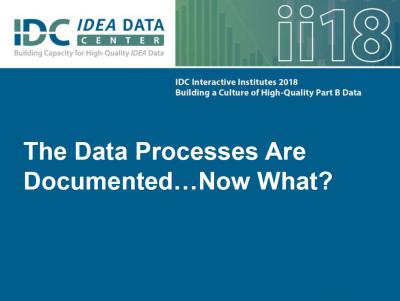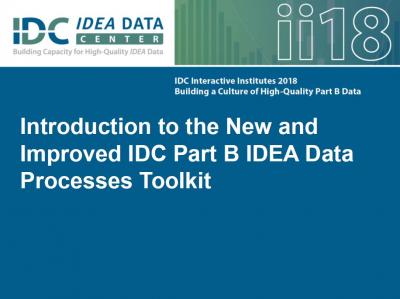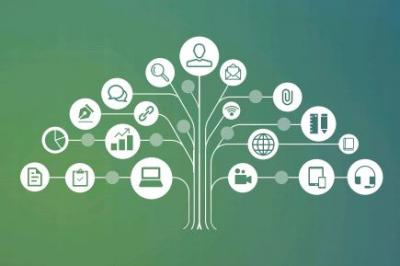Site Search
Results 1 - 7 of 14
Format: Toolkits
SEA Data Processes ToolkitUsing the SEA Data Processes Toolkit to document data processes for all 616 and 618 data collections will establish a well-managed process for data collection, validation, and submission. In collaboration with IDC State Liaisons, states can use the toolkit to create and maintain a culture of high-quality data and establish and support consistent practices that produce valid and reliable data, while building the capacity of state staff.
Format: Toolkits
LEA Data Processes ToolkitThere is a continuous need for state education agencies (SEAs) and local education agencies (LEAs) to collect and report comprehensive, high-quality data and ensure they report data accurately and in a timely fashion. The customizable IDC LEA Data Processes Toolkit is a new instrument that can improve decisionmaking about children and youth with disabilities by ensuring data are of high quality and processes are clearly defined and documented, while also providing data staff a map for documenting data processes within local districts.
Format: Applications and Spreadsheets
IDEA Part B Data Manager CompetenciesThe IDEA Part B Data Manager Competencies tool outlines foundational knowledge and skills necessary for typical data manager roles and responsibilities. The competencies reflect principles for effective management, support, and use of high-quality IDEA Part B data and fall under one of three overarching categories: content knowledge and skills, technical knowledge and skills, and interpersonal skills.
Format: Presentations
Taking Data Processes Documentation to the Next LevelThis workshop provided participants an opportunity to envision and begin development of a comprehensive plan for creating protocols and follow-up activities they may use at both the SEA and LEA levels. Session activities focused on identifying appropriate roles to be represented at the table. They also focused on methods for engaging staff in the work and other critical considerations for implementing and sustaining these foundational data practices.
Format: Presentations
The Data Processes Are Documented…Now What?Completing data documentation using IDC’s Part B IDEA Data Processes Toolkit provides many benefits to state agencies. After developing one or more of the protocols, state staff have seen firsthand the benefits of improved understanding of the data and communication about the data processes. This session provided a rationale for ongoing use of the data process protocols and how their use can help build capacity to create a culture of high-quality data at both the SEA and LEA levels.
Format: Presentations
Introduction to the New and Improved IDC Part B IDEA Data Processes ToolkitThis workshop provided a brief overview of the new IDC IDEA Part B 616 Data Processes Toolkit. Several states that have piloted the toolkit shared their experiences with creating data processes for the SPP/APR indicators, building capacity of data stewards, and instilling a culture of high-quality data. Presenters facilitated discussion that helped participants understand the value of data processes documentation and afforded them an opportunity to experience preparing for and beginning this work.
Format: Toolkits and Templates
Part C IDEA Data Processes ToolkitUsing the Part C IDEA Data Processes Toolkit to document data processes for all 616 and 618 data collections will establish a well-managed process for data collection, validation, and submission. In collaboration with IDC State Liaisons, states can use the toolkit to create and maintain a culture of high-quality data and establish and support consistent practices that produce valid and reliable data, while building the capacity of state staff. The toolkit contains an overview of the toolkit, Data Collection Protocols, SPP/APR Indicator Protocols, a State Landscape Protocol, a Local EI Program Determinations Protocol, a Data Collections Calendar, and additional resources that provide a structure for documenting data processes. The Data Collection Protocols are in Word, and states can tailor them meet their states' specific documentation needs.


